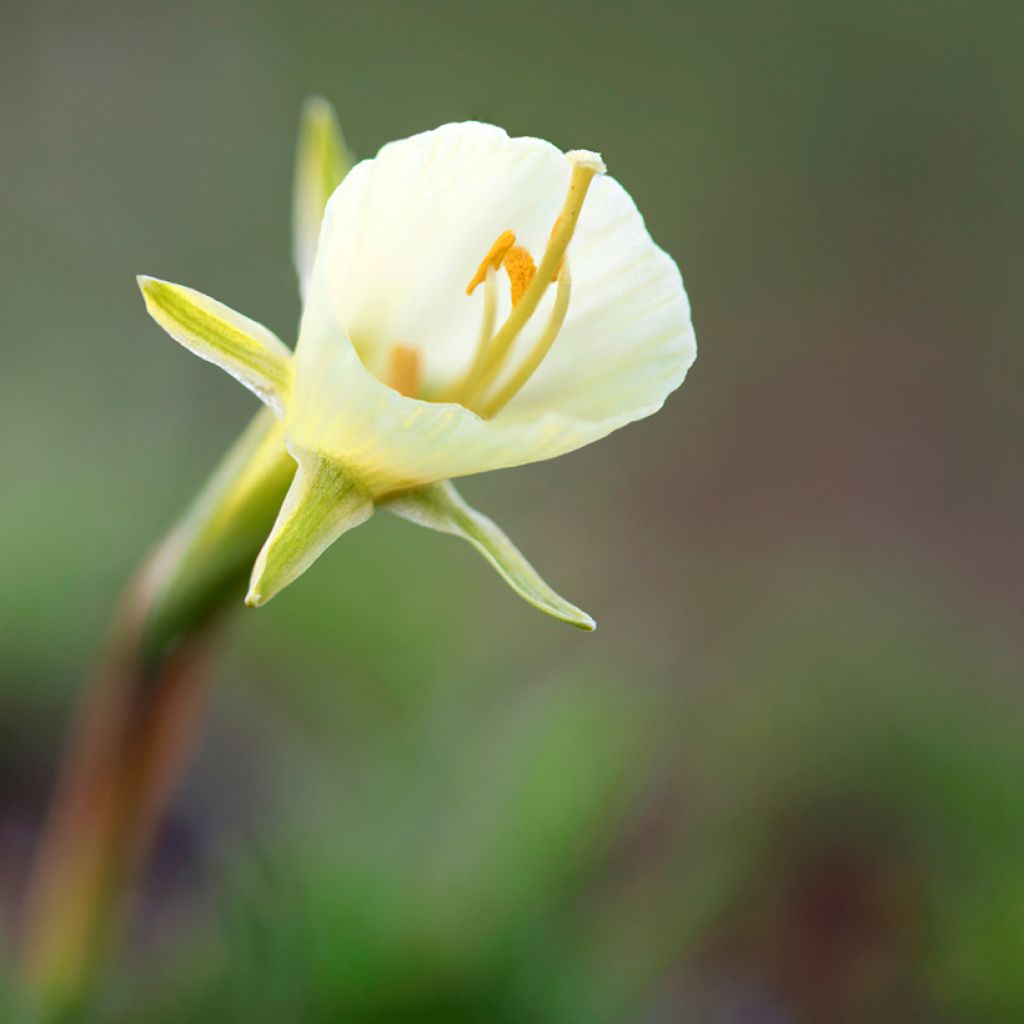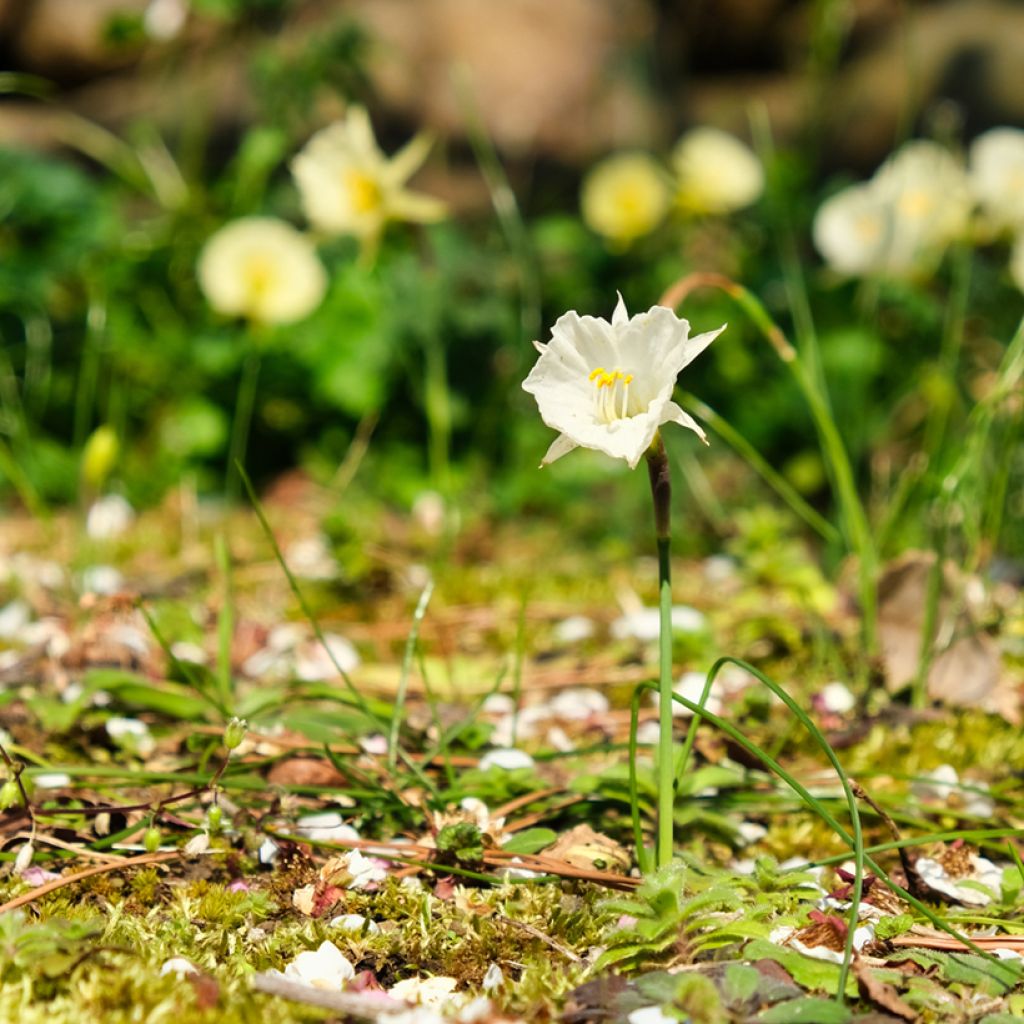

Narcisse bulbocodium White Petticoat


Narcisse bulbocodium White Petticoat
Narcissus (x) bulbocodium conspicuus White Petticoat
Narcissus (x) bulbocodium conspicuus White Petticoat
Hooped Petticoat Daffodil, Conspicuous Narcissus
This plant carries a 6 months recovery warranty
More information
We guarantee the quality of our plants for a full growing cycle, and will replace at our expense any plant that fails to recover under normal climatic and planting conditions.
From €5.90 for pickup delivery and €6.90 for home delivery
Express home delivery from €8.90.
Does this plant fit my garden?
Set up your Plantfit profile →
Description
The Narcissus bulbocodium 'White Petticoat' is a small but unusual and rather robust daffodil. This variety with large white flowers is a beautiful improvement of a native botanical species in the Atlantic-European region. It has pure white flowers composed of a swollen central corolla, shaped like a petticoat, emerging from a discreet crown of 6 very thin sepals. The yellow stamens shine in the centre. This bulbous plant blooms more or less early depending on the climate, usually in March-April. To succeed in its cultivation, give it sun and well-drained, light, rather sandy soil, moist to dry in summer. This crinoline daffodil also allows for flowering pots in the heart of winter. A charming duo with the yellow variety Golden Bells!
The Narcissus bulbocodium, also known as the crinoline daffodil or medusa's trumpet, belongs to the amaryllidaceae family. It is a common species in the western Mediterranean, from Morocco to Spain, and to the south of France. It is widespread, particularly in Languedoc-Roussillon and Gironde, often on poor soils. The Narcissus bulbocodium 'White Petticoat' is a horticultural creation dating back to 2017. It is the largest form with pure white flowers from N. bulbocodium conspicuus. It is resistant to cold and drought, and prolific. This variety reaches between 10 and 15 cm (4 and 6in) tall in bloom. Its flowers are composed of a corolla of modest, very thin petals, on which a very flared and very swollen corolla is inserted, almost completely eclipsing the small crown of petals. It is an early flowering plant, capable of blooming from the second half of February when well established, or even in autumn in favorable climates. The very fine foliage, which can be mistaken for tender grass, is deciduous in summer. In mild climates, it develops with the first rains in September and persists in winter. This variety easily multiplies through spontaneous sowing and production of bulblets, from an ovoid bulb the size of a hazelnut.
The Narcissus bulbocudium 'White Petticoat' grows in well-drained and loosened, light soil, results are less good in soils that are too wet in summer. There is such a choice of varieties among daffodils that you can enjoy them for three months, in spring, without getting bored for a single moment. They have in common the ability to naturalise easily, to adore white and yellow and white, and to often emit sweet fragrances. Many reasons to grow them in large clumps (at least 20 bulbs) for a multiplied effect. Associate the crinoline daffodil, in natural-looking flower beds, with scillas and hyacinths, accompany them with early botanical tulips, botanical crocuses, but also forget-me-nots, pansies, or liverworts. In pots, this daffodil is also perfect
Report an error about the product description
Plant habit
Flowering
Foliage
Botanical data
Narcissus
(x) bulbocodium conspicuus
White Petticoat
Amaryllidaceae
Hooped Petticoat Daffodil, Conspicuous Narcissus
Mediterranean
Planting and care
The Narcissus bulbocodium 'White Petticoat' grows well in well-drained and loosened soil, moist during the growing period but rather dry in summer. It also prefers limestone soils. The further south you go, the less difficult it will be regarding the nature of the soil. Plant the bulbs from September to mid-December, 8 cm (3in) deep, with a spacing of 8 cm (3in), in a sunny location. Do not disturb them, and each year your daffodils will produce more and more flowers. It is not recommended to water them in summer, even in a dry and hot climate. The daffodils remain in the ground. Remove faded flowers to promote the accumulation of new reserves in the bulb. After flowering, let the foliage die naturally and only cut it when it turns yellow. If the clumps become too dense, they flower less well, so they can be divided from July to September when the leaves are dry. You can replant the bulbs (undamaged) immediately.
Cultivation in pots:
Bulbs grown in pots can be repotted in late summer. Take the opportunity to check the condition of the bulbs, which should not show any signs of rot. Plant them in a mixture rich in gravel and drainage. Use a potassium-rich fertiliser, specifically for bulbs, which you will dilute in the watering can (strongly dilute the dose prescribed by the manufacturer). Water during the vegetative period but stop watering in summer.
Planting period
Intended location
Care
This item has not been reviewed yet - be the first to leave a review about it.
Haven't found what you were looking for?
Hardiness is the lowest winter temperature a plant can endure without suffering serious damage or even dying. However, hardiness is affected by location (a sheltered area, such as a patio), protection (winter cover) and soil type (hardiness is improved by well-drained soil).

Photo Sharing Terms & Conditions
In order to encourage gardeners to interact and share their experiences, Promesse de fleurs offers various media enabling content to be uploaded onto its Site - in particular via the ‘Photo sharing’ module.
The User agrees to refrain from:
- Posting any content that is illegal, prejudicial, insulting, racist, inciteful to hatred, revisionist, contrary to public decency, that infringes on privacy or on the privacy rights of third parties, in particular the publicity rights of persons and goods, intellectual property rights, or the right to privacy.
- Submitting content on behalf of a third party;
- Impersonate the identity of a third party and/or publish any personal information about a third party;
In general, the User undertakes to refrain from any unethical behaviour.
All Content (in particular text, comments, files, images, photos, videos, creative works, etc.), which may be subject to property or intellectual property rights, image or other private rights, shall remain the property of the User, subject to the limited rights granted by the terms of the licence granted by Promesse de fleurs as stated below. Users are at liberty to publish or not to publish such Content on the Site, notably via the ‘Photo Sharing’ facility, and accept that this Content shall be made public and freely accessible, notably on the Internet.
Users further acknowledge, undertake to have ,and guarantee that they hold all necessary rights and permissions to publish such material on the Site, in particular with regard to the legislation in force pertaining to any privacy, property, intellectual property, image, or contractual rights, or rights of any other nature. By publishing such Content on the Site, Users acknowledge accepting full liability as publishers of the Content within the meaning of the law, and grant Promesse de fleurs, free of charge, an inclusive, worldwide licence for the said Content for the entire duration of its publication, including all reproduction, representation, up/downloading, displaying, performing, transmission, and storage rights.
Users also grant permission for their name to be linked to the Content and accept that this link may not always be made available.
By engaging in posting material, Users consent to their Content becoming automatically accessible on the Internet, in particular on other sites and/or blogs and/or web pages of the Promesse de fleurs site, including in particular social pages and the Promesse de fleurs catalogue.
Users may secure the removal of entrusted content free of charge by issuing a simple request via our contact form.
The flowering period indicated on our website applies to countries and regions located in USDA zone 8 (France, the United Kingdom, Ireland, the Netherlands, etc.)
It will vary according to where you live:
- In zones 9 to 10 (Italy, Spain, Greece, etc.), flowering will occur about 2 to 4 weeks earlier.
- In zones 6 to 7 (Germany, Poland, Slovenia, and lower mountainous regions), flowering will be delayed by 2 to 3 weeks.
- In zone 5 (Central Europe, Scandinavia), blooming will be delayed by 3 to 5 weeks.
In temperate climates, pruning of spring-flowering shrubs (forsythia, spireas, etc.) should be done just after flowering.
Pruning of summer-flowering shrubs (Indian Lilac, Perovskia, etc.) can be done in winter or spring.
In cold regions as well as with frost-sensitive plants, avoid pruning too early when severe frosts may still occur.
The planting period indicated on our website applies to countries and regions located in USDA zone 8 (France, United Kingdom, Ireland, Netherlands).
It will vary according to where you live:
- In Mediterranean zones (Marseille, Madrid, Milan, etc.), autumn and winter are the best planting periods.
- In continental zones (Strasbourg, Munich, Vienna, etc.), delay planting by 2 to 3 weeks in spring and bring it forward by 2 to 4 weeks in autumn.
- In mountainous regions (the Alps, Pyrenees, Carpathians, etc.), it is best to plant in late spring (May-June) or late summer (August-September).
The harvesting period indicated on our website applies to countries and regions in USDA zone 8 (France, England, Ireland, the Netherlands).
In colder areas (Scandinavia, Poland, Austria...) fruit and vegetable harvests are likely to be delayed by 3-4 weeks.
In warmer areas (Italy, Spain, Greece, etc.), harvesting will probably take place earlier, depending on weather conditions.
The sowing periods indicated on our website apply to countries and regions within USDA Zone 8 (France, UK, Ireland, Netherlands).
In colder areas (Scandinavia, Poland, Austria...), delay any outdoor sowing by 3-4 weeks, or sow under glass.
In warmer climes (Italy, Spain, Greece, etc.), bring outdoor sowing forward by a few weeks.



































